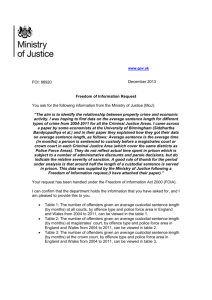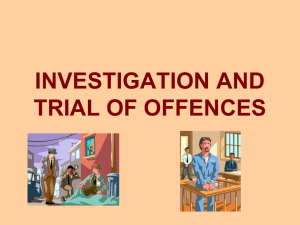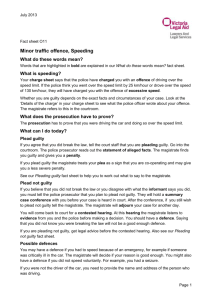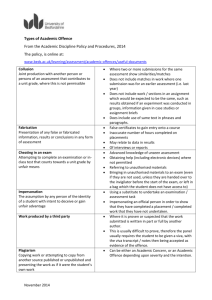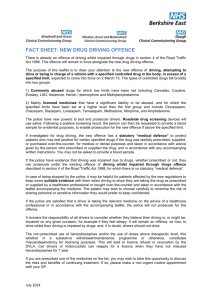What do these words mean?
advertisement
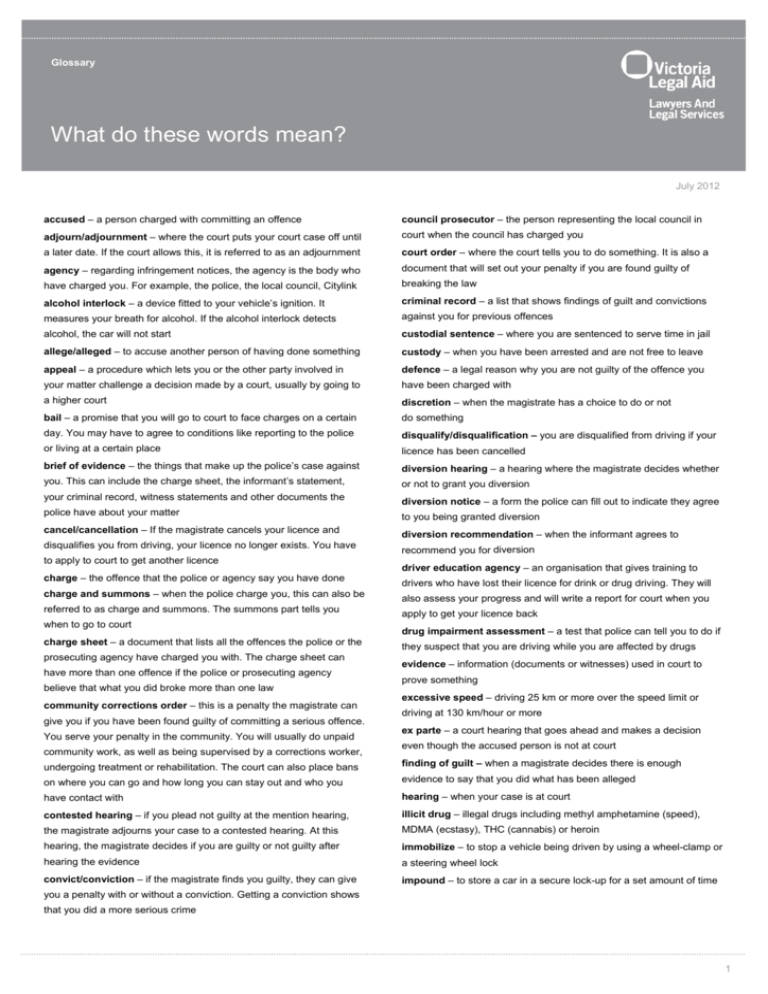
Glossary What do these words mean? July 2012 accused – a person charged with committing an offence council prosecutor – the person representing the local council in adjourn/adjournment – where the court puts your court case off until court when the council has charged you a later date. If the court allows this, it is referred to as an adjournment court order – where the court tells you to do something. It is also a agency – regarding infringement notices, the agency is the body who document that will set out your penalty if you are found guilty of have charged you. For example, the police, the local council, Citylink breaking the law alcohol interlock – a device fitted to your vehicle’s ignition. It criminal record – a list that shows findings of guilt and convictions measures your breath for alcohol. If the alcohol interlock detects against you for previous offences alcohol, the car will not start custodial sentence – where you are sentenced to serve time in jail allege/alleged – to accuse another person of having done something custody – when you have been arrested and are not free to leave appeal – a procedure which lets you or the other party involved in defence – a legal reason why you are not guilty of the offence you your matter challenge a decision made by a court, usually by going to have been charged with a higher court discretion – when the magistrate has a choice to do or not bail – a promise that you will go to court to face charges on a certain do something day. You may have to agree to conditions like reporting to the police disqualify/disqualification – you are disqualified from driving if your or living at a certain place licence has been cancelled brief of evidence – the things that make up the police’s case against diversion hearing – a hearing where the magistrate decides whether you. This can include the charge sheet, the informant’s statement, or not to grant you diversion your criminal record, witness statements and other documents the diversion notice – a form the police can fill out to indicate they agree police have about your matter to you being granted diversion cancel/cancellation – If the magistrate cancels your licence and diversion recommendation – when the informant agrees to disqualifies you from driving, your licence no longer exists. You have to apply to court to get another licence charge – the offence that the police or agency say you have done charge and summons – when the police charge you, this can also be referred to as charge and summons. The summons part tells you when to go to court charge sheet – a document that lists all the offences the police or the prosecuting agency have charged you with. The charge sheet can have more than one offence if the police or prosecuting agency believe that what you did broke more than one law community corrections order – this is a penalty the magistrate can give you if you have been found guilty of committing a serious offence. You serve your penalty in the community. You will usually do unpaid community work, as well as being supervised by a corrections worker, recommend you for diversion driver education agency – an organisation that gives training to drivers who have lost their licence for drink or drug driving. They will also assess your progress and will write a report for court when you apply to get your licence back drug impairment assessment – a test that police can tell you to do if they suspect that you are driving while you are affected by drugs evidence – information (documents or witnesses) used in court to prove something excessive speed – driving 25 km or more over the speed limit or driving at 130 km/hour or more ex parte – a court hearing that goes ahead and makes a decision even though the accused person is not at court undergoing treatment or rehabilitation. The court can also place bans finding of guilt – when a magistrate decides there is enough on where you can go and how long you can stay out and who you evidence to say that you did what has been alleged have contact with hearing – when your case is at court contested hearing – if you plead not guilty at the mention hearing, illicit drug – illegal drugs including methyl amphetamine (speed), the magistrate adjourns your case to a contested hearing. At this MDMA (ecstasy), THC (cannabis) or heroin hearing, the magistrate decides if you are guilty or not guilty after immobilize – to stop a vehicle being driven by using a wheel-clamp or hearing the evidence a steering wheel lock convict/conviction – if the magistrate finds you guilty, they can give impound – to store a car in a secure lock-up for a set amount of time you a penalty with or without a conviction. Getting a conviction shows that you did a more serious crime 1 indictable offence – a serious offence where the person accused can stay/stayed – where the court puts the order on hold until after a ask for the charge to be heard before a judge and jury. Many rehearing or an appeal. When the court orders are stayed, they do not indictable offences can be heard in the Magistrates’ Court if the have to be followed. It can also mean a period of time to pay a fine accused person agrees stood down – your case is put on hold briefly and called back on that informant – the police officer or government official (for example, a same day for completion ticket inspector) who charged you and who will give evidence against summary case conference – a meeting between you and the police you in court prosecutor where you talk about your charges and exactly what you informant’s statement – the informant’s description of how they disagree with. You have this meeting before you go into the courtroom believe you broke the law summary offence – an offence that is less serious and can be heard mention hearing – the first hearing for a case in the in the Magistrates’ Court Magistrates’ Court summons – a court document that tells you when you must go offence – to break the law to court owner– includes a person who keeps or holds an animal or has the suspend/suspension - if the magistrate suspends your licence, it is animal in their care or who is in control of the animal when it is outside put on hold for a fixed period. You will have to go to Vic Roads to re- the owner’s property apply for it notice to appear – a document the police can give you when they tax prosecutor – the officer from the Australian Taxation Office who suspect you of breaking the law. The document tells you to go to court will present the case against you in court if you have not lodged a on a certain date. The police will usually give the notice to appear to tax return you rather than sending it to you triable summarily – an indictable offence that can be dealt with by a penalty – a punishment for breaking the law magistrate in the Magistrates’ Court plea/plead – a plea is your response in the courtroom to the charge. undertaking – a promise to the court to do or not do certain things You can plead guilty or not guilty Vic Roads – the Victorian government agency that administers road preliminary brief – this is a shorter version of the brief of evidence, rules and regulations which you will get early on in the process. The preliminary brief will warrant – an order by the court for your arrest give you details of the prosecution’s case witness – a person who gives evidence in writing or in person at court prescription drug – a drug that you get from a chemist with a script witness summons – a document used to summon a witness to come from your doctor or dentist to court to give evidence or to give in documents as evidence prior convictions – your criminal record prosecution authority – a fisheries officer from the Department of Primary Industries who presents the case in court prosecutor – the police officer who gives the police’s case in the courtroom. Also referred to as the police prosecutor. The prosecutor can also be a government official (for example, a corrections worker) or someone working for an agency that issued you with an infringement notice proven – when a charge is found proven, it means that the magistrate has found you guilty of committing the offence that the police charged you with sentence – If you plead guilty or the magistrate finds you guilty, they will then sentence you according to the offence you committed. That means the magistrate gives you a penalty and, if your offence was serious, the magistrate may also give you a conviction. Secondly, the conviction and the penalty is referred to as the sentence sentencing indication – the magistrate can give you an idea of what sentence they would give you if you plead guilty. This sentencing indication may help you to decide if you want to keep pleading not guilty or to plead guilty serve – delivery of a document to someone statement of alleged facts – this is the informant’s summary of what the offence was and how it happened. The statement of alleged facts can contain evidence from witnesses, if there were any © 2012 Victoria Legal Aid. Reproduction without express written permission is prohibited. Permission may be granted to community organisations to reproduce, free of any charge, part or all of this publication. Written requests should be directed to the Community Legal Education Manager, Victoria Legal Aid. GLOSS-000-DL-0712 2
